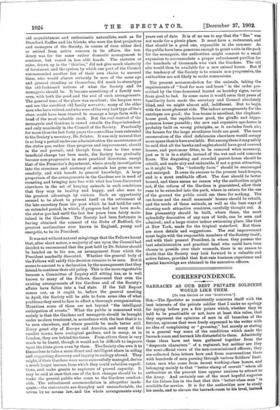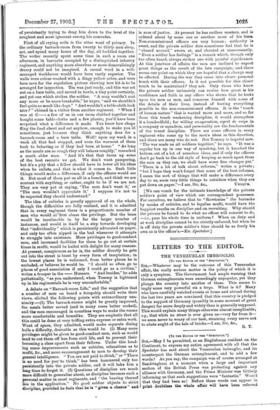CORRESPONDENCE.
BARRACKS AS OUR BEST PRIVATE SOLDIERS WOULD LIKE THEM.
[To THE EDITOR OF THE "Seamen:m."]
Sra,—The Spectator so consistently concerns itself with the best interests of the private soldier that I make no apology for laying before you a few points which, whether they be held to be practicable or not, have at least this value, that they represent the opinions of men in all branches of the Service, opinions that were freely expressed to the writer with no idea of complaining or "grousing," but merely as stating in a general way some of the conditions which made the barrack-room and barrack life distasteful to them. Admittedly these ideas have not been gathered together from the "desperate characters" of a regiment, but neither are they the semi-official views of the non-commissioned officers; they are collected from letters here and from conversations there with hundreds of men passing through various Soldiers' Insti- tutes, men who come from decent working-class homes, and belonging mainly to that "better stamp of recruit" whom all authorities at the presant time appear anxious to attract to the Army. And certainly one of the most hopeful auguries for the future lies in the fact that this "better-class man" is available for service. It is for the authorities now to study his needs, and to elevate the barrack-room to his level, instead of persistently trying to drag him down to the level of the roughest and most ignorant among his comrades.
First of all crying evils is the utter want of privacy. In the ordinary barrack-room from twenty to thirty men sleep, eat, and spend many hours of the day, all huddled together. The writer recently spent some time in such a room one afternoon, in barracks occupied by a distinguished infantry regiment, and anything more cheerless or more demoralisingly dreary could not be imagined. A casual ward in a well- managed workhouse would have been vastly superior. The walls were colour-washed with a dingy yellow ochre, and were bare save for the regulation picture showing how kit is to be arranged for inspection. Tea was just' ready, and this was set out on a bare table, and served in bowls, a tiny point certainly, and yet one which strikes the soldier. "A mug wouldn't cost any more or be more breakable," he urges, "and we shouldn't feel quite so much like dogs." "And wouldn't a table-cloth look nice ? " chimed in a visitor from another regiment. "When I was at C— a few of us in our room clubbed together and bought some table-cloths and a few plants; you'd have been surprised what a difference it made. You know how chaps fling the food about and eat anyhow, enough to make you ill sometimes, just because they think anything does for a barrack-room and a bare table. Well! upon my word, in a week all that had stopped, and even the warmest of them took to behaving as if they had been at home." "As long as the meals are so rough they will behave roughly," remarked a much older man. "And it's that that turns up some of the best recruits we get. We don't want pampering, but it's a pity that a fellow should have to lower all his ideas when he enlists, and that is what it comes to. Such little things would make a difference, if only the officers would sae it. But most of them put us all in a bunch, and think we are content with anything, or rather, ought to be if we are not. They are very pat at saying, The men don't want it,' or The men wouldn't appreciate it.' I suppose it's not to be expected they should understand."
The idea of cubicles is greatly approved of on the whole, though the difficulties are fully realised, and it is admitted that in every regiment there is a proportionate number of men who would at first abuse the privilege. But the boon would be inestimable in by far the larger number of *stances, and would in itself be a step towards developing that "individuality" which is persistently advocated on paper, and only too often nipped in the bud whenever it attempts to struggle into existence. More privileges to good-conduct men, and increased facilities for them to go out at certain times in mufti, would be hailed with delight for many reasons. At present, conspicuous as he is, the soldier directly he gets out into the street is beset by every form of temptation; in the lowest places he is welcomed, from better places he is excluded, or believes he would be. "I should so often go to places of good association if only I could go as a civilian," 'mites a trooper in the — Hussars. "And besides," he adds pathetically, "as you understand, when Tommy is tightened up in his regimentals he is very uncomfortable."
A debate on "Barrack-room Life," and the suggestion that a number of men on board a troopship should write their views, elicited the following points with extraordinary una- nimity :—(1) The barrack-rooms might be greatly improved, the meals better served (and in many cases better cooked), and the men encouraged in countless ways to make the rooms more comfortable and ,homelike. They are emphatic that all this could be done at very trifling extra expense or extra work. Want of space, they admitted, would make separate dining halls a difficulty, desirable as this would be. (2) Many more privileges might be given to good-conduct men, such as would tend to cut them off less from civil life, and to prevent their becoming a class apart from their fellows. Under this head- ing come improvements such as cubicles, relaxations as to mufti, are., and more encouragement to men to develop their general intelligence. "You are not paid to.think," or "There is no need for you' to think," has been hammered only too persistently into the private soldier, and it will take him a long time to forget it. (3) Questions of discipline are much more difficult to generalise about, as discipline becomes such a personal matter in most regiments, and "the bearing thereof lies in the application." No good soldier objects to strict discipline, provided he feels that he is "given a chance" and is sure of justice. At present he has endless masters, and is ordered about by some one or another most of his time. Non-commissioned officers are very human ; authority is sweet, and the private soldier does sometimes feel that he is "chased around," sworn at, and shouted at unnecessarily. "Even a soldier has feelings" is a remark which, though only too often heard, always strikes one with painful significance. At this juncture of affairs the men are inclined to expect great things as the result of the late campaign; and there seems one point on which they are hopeful that a change may be effected. During the war they came into closer personal touch with their officers. Is it not possible for this closer touch to be maintained ? they ask. Only those who know the private soldier intimately can realise how great is his confidence and faith in any officer who shows that he looks upon his men as men, and concerns himself with some of the details of their lives, instead of leaving everything possible to the non-commissioned officers. It is the "touch of human nature" that is wanted more and more, and so far from this touch weakening discipline, it would strengthen it a hundredfold ; for willing co-operation, esprit de corps in a company or squadron, and personality are the fundamentals of the truest discipline. There are some officers in every regiment who come up to the men's ideas in this direction, and there are many who do not. But Tommy is hopeful now. "The war made us all soldiers together," he says. "It was a regular box up in one way of speaking, but it knocked the bottom out of a lot of senseless ideas, and if only the officers don't go back to the old style of keeping as much apart from the men as they can, we shall have some fine changes yet." "There is a lot of talk about reforms," writes a private ; "but I hope they won't forget that some of the beet reforms, I mean the sort of things that will make a difference every day to us, seem very little things to outsiders when they are
put down on paper."—I am, Sir, &e., UBIQUZ.
[We can vouch for the intimate knowledge of the private soldier's point of view which our correspondent possesses. For ourselves, we believe that to "Rowtonise " the barracks by means of cubicles, and to legalise mufti, would have the happiest results on discipline and on recruiting. Why should the private be forced to do what no officer will consent to do, —i.e., pass his whole time in uniform P When on duty and at work discipline cannot be too strictly enforced, but when he is off duty the private soldier's time should be as freely his own as is the officer's.—En. Spectator.]







































 Previous page
Previous page